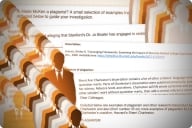You have /5 articles left.
Sign up for a free account or log in.
In his autobiography, Benjamin Franklin describes how, as a striving young man in Philadelphia, he practiced a quite literal variety of moral bookkeeping. Having determined 13 virtues he ought to cultivate (temperance, frugality, chastity, etc.), he listed them on a table or grid, with the seven days of the week as its horizontal element. At night, before bed, he would make a mark for each time he had succumbed to a vice that day, in the row for the virtue so compromised.
A dot in the ledger was a blot on his character. Franklin explicitly states that his goal was moral perfection; the 13th virtue on his list was humility, almost as an afterthought. But without claiming to have achieved perfection, Franklin reports that his self-monitoring began to show results. Seeing fewer markings on the page from week to week provided a form of positive reinforcement that made Franklin, as he put it in his late 70s, “a better and a happier man than I otherwise should have been had I had not attempted it.”
Franklin’s feedback system was a prototype of the 21st-century phenomenon analyzed by Deborah Lupton in The Quantified Self (Polity), a study of how digital self-tracking is insinuating itself into every nook and cranny of human experience. (The author is a research professor in communication at the University of Canberra in Australia.) A device or application is available now for just about any activity or biological function you can think of (if not, just wait), generating a continuous flow of data. It’s possible to keep track of not only what you eat but where you eat it, at what time and how much ground was covered in walking to and from the restaurant, assuming you did.
In principle, the particulars of your digestive and excretory processes could also be monitored and stored: Lupton mentions “ingestible digital tablets that send wireless signals from inside the body to a patch worn on the arm.” She does not elaborate, but a little follow-up shows that their potential medical value is to provide “an objective measure of medication adherence and physiologic response.” Wearable devices can keep track of alcohol consumption (as revealed by sweat), as well as every exertion and benefit from a fitness routine. Sensor-equipped beds can monitor your sleep patterns and body temperature, not to mention “sounds and thrusting motions” possibly occurring there.
Self-tracking in the digital mode yields data about the individual characterized by harder-edged objectivity than even the most brutally honest self-assessment might allow. For Franklin, the path to self-improvement involved translating the moral evaluation of his own behavior into an externalized, graphic record; it was an experiment with the possibility of increasing personal discipline through enhanced self-awareness. The tools and practices that Lupton discusses -- the examples cited above are just a small selection -- expand upon Franklin’s sense of the self as something to be quantified, controlled and optimized. The important difference lies in how comprehensive and automated the contemporary methods are (many of the apps and devices can run in the background of everyday life, unnoticed most of the time), as well as how much more strongly they imply a technocratic sense of the world.
“The body is represented as a machine,” writes Lupton, “that generates data requiring scientific modes of analysis and contains imperceptible flows and ebbs of data that need to be identified, captured and harnessed so that they may be made visible to the observer.” But not only the body: other forms of self-tracking are available to monitor (and potentially to control) productivity, mood and social interaction. One device, “worn like a brooch … listens to conversations with and around the wearer and lights up when the conversation refers to topics that the user has listed in the associated app.”
Along with the ability to monitor and control various dimensions of an individual’s existence, there is likely to come the expectation or obligation to do so. On this point, Lupton’s use of the idea of self-reflexivity (as developed by the social theorists Zygmunt Bauman, Ulrich Beck and Anthony Giddens) proves more compelling than her somewhat perfunctory and obligatory references to Michel Foucault on “technologies of self” or Christopher Lasch on “the culture of narcissism.” The digitally enhanced, self-monitoring 21st-century citizen must meet the challenge of continuously “seeking information and making choices about one’s life in a context in which traditional patterns and frameworks that once structured the life course have largely dissolved … Because [people] must do so, their life courses have become much more open, but also much more subject to threats and uncertainties,” especially “in a political context of the developed world -- that of neoliberalism -- that champions self-responsibility, the market economy and competition and where the state is increasingly withdrawing from offering economic support to citizens.”
In such a context, high-tech self-tracking can provide access to exact, objective self-knowledge about health, productivity, status (there are apps that keep track of your standing in the world of social media) and so on. Know thyself -- and control thy destiny! Or so it would seem, if not for a host of issues around who has ownership, use or control of the digital clouds that shadow us. Lupton points to a recent case in which lawyers won damages in a personal-injury suit using data from a physical fitness monitor: the victim’s numbers from before and after the accident were concrete testimony to its effect. Conversely, it is not difficult to imagine such data being subpoenaed and used against someone.
The unintended consequences may also take the form of changed social mores: “Illness, emotional distress, lack of happiness or lack of productivity in the workplace come to be represented primarily as failures of self-control or efficiency on the part of individuals, and therefore as requiring greater or more effective individual efforts -- including perhaps self-tracking regimens of increased intensity -- to produce a ‘better self.’” Advanced technology may offer innovative ways to dig ourselves out of the hole, with the usual level of success.
Lupton is not opposed to self-tracking any more than she is a celebrant of it, in the manner of a loopy technovisionary prophet who announces, “Data will become integral with our sensory, biological self. And as we get more and more connected, our feeling of being tied into one body will also fade, as we become data creatures, bodiless, angelized.” (I will avoid naming the source of that quotation and simply express hope that it was meant to be a parody of Timothy Leary.) Instead, The Quantified Self is a careful, evenhanded survey of a trend that is on the cusp of seeming so ubiquitous that we’ll soon forget how utterly specific the problems associated with this aspect of our sci-fi future are to the wealthy countries, and how incomprehensible they must seem to the rest of the planet.








